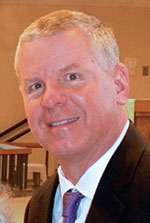Reflection / Mike Krokos
Like it or not, I’ll be praying
 I, like others in our newsroom, usually write potential headlines for a story, column or reflection after the work is complete.
I, like others in our newsroom, usually write potential headlines for a story, column or reflection after the work is complete.
Not this time.
This one was etched in my memory after receiving emails from our son’s school system detailing a pair of tragedies that recently occurred.
We live in the greater Indianapolis metro area, and our youngest is a student in what we consider a very good public school system.
He is in middle school, and we have been pleased with the education he has received thus far.
But one thing my wife Madeline and I have noticed is how this school system is doing all it can to make sure the word “prayer” is never a part of its communication, particularly in times of tragedy. And we know there are many public school systems around the
U.S. who avoid using that word as well. At least that’s the impression we’ve gotten.
I grew up attending public schools, where each day started with the Pledge of Allegiance, a patriotic song and prayer. Granted, that was years ago. (For those curious, I am north of 50 years old.)
I understand times have changed in our public schools, but I am left to wonder why in 2021 some avoid using the word “prayer” and encouraging it in an email or other form of communication for those facing a sudden or tragic loss?
Has our society evolved to such an extreme that it’s considered taboo for some to even use that word in a public setting?
I hope—and pray—that’s not the case. But sadly, I fear, for many, it is.
The school system’s recent email concerning the first sudden tragedy, read: “We ask that you keep his family in your thoughts as they cope with this difficult loss.” The email about the second tragedy was similar: please keep our school and this family “in your thoughts as they process this difficult loss.” Not a word was mentioned about praying for these families, who were no doubt left devastated and heartbroken.
Tragically, as I wrote this piece, another area public school system began dealing with the devastating loss of a student, and school officials in a statement wrote, “Please keep these families and our students in your thoughts and prayers.”
I believe school leaders in this case understand there is no endorsement of a particular faith tradition in using the word “prayer.”
In its regulations, I know the U.S. Department of Education (USDOE) states that school employees, when acting in their official capacity, are prohibited by the First Amendment from encouraging or discouraging prayer. But I also believe USDOE’s guidance is interpreted differently by some. And I think the vast majority of people, when they hear of a tragedy, find themselves going to prayer.
Maybe it’s because we are lifelong Catholics, but my wife’s and my instincts were immediately—as this last school system suggested—to pray for those affected by the tragedy.
What I find just as frustrating is seeing similar sentiments excluding prayer when a tragedy is highlighted on a news show or sports broadcast—be it of the local or national variety.
I’ve heard local talk show hosts and national TV anchors on several occasions asking listeners or viewers to offer “thoughts” for the victim or victims of a tragedy.
Sorry, maybe I’m in the minority, but I cannot do that without prayer. For me, “thoughts and prayers” go hand in hand. One cannot exist without the other.
I understand there are various faith traditions that make up this great nation. And there have been bumps in the road where some have serious differences, be it in how they are practiced, philosophically or otherwise. But one thing I believe they all have in common—Catholics, Protestants, our Jewish brothers and sisters, Muslims and people who profess so many other faiths—is to be people of prayer.
What I have learned is a certain segment of society frowns upon it. But our faith has taught me that prayer is one of the greatest gifts I can offer to others, even if they are not people of faith and pray themselves.
“With all prayer and supplication, pray at every opportunity in the Spirit. To that end, be watchful with all perseverance and supplication for all the holy ones” (Eph 6:18).
“Therefore I tell you, all that you ask for in prayer, believe that you will receive it and it shall be yours” (Mk 11:24).
Scripture is full of references to prayer.
And as a Catholic, I feel called to offer petitions for the hungry, the homeless, the unborn, the persecuted and those who have suffered unforeseen tragedies in our world.
As the headline for this reflection reads: “Like it or not, I’ll be praying.”
(Mike Krokos is editor of The Criterion, newspaper of the Archdiocese of Indianapolis.) †
 I, like others in our newsroom, usually write potential headlines for a story, column or reflection after the work is complete.
I, like others in our newsroom, usually write potential headlines for a story, column or reflection after the work is complete.